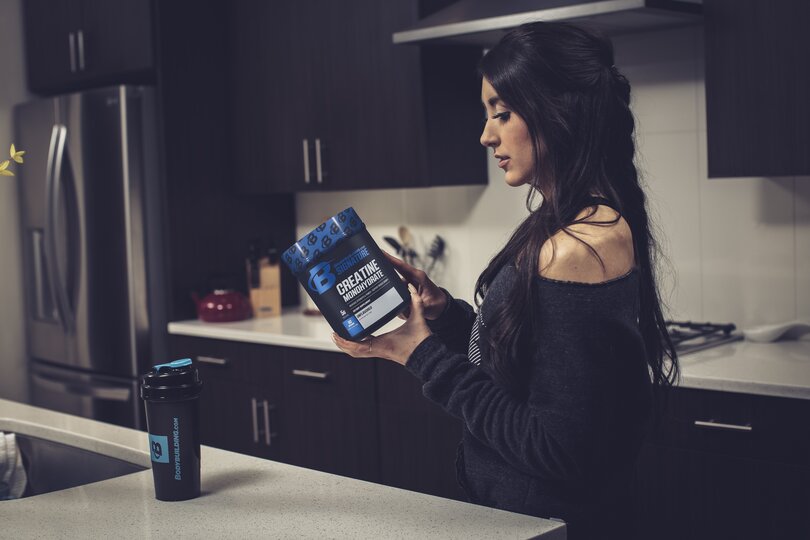Creatine is one the most researched supplements in the industry today, but is marketed heavily for men and its muscle building properties. However, creatine has a plethora of other potential benefits outside of muscle building and these benefits are important for everyone, especially women. Let’s take a look at what the research says!
Why Do Women Need Creatine?
Bodybuilding.com’s Master Coach, Sam Sweeney is a strong advocate for women taking creatine “Because it works.” Sam goes on to say “There have been numerous studies, research, and clinical trials done proving the effectiveness of creatine not only for muscle building and endurance purposes but in other areas such as brain health and development, and hormonal benefits. More and more research comes out everyday proving the benefits of supplementing with creatine for both men and women, which is really exciting to see.” Those countless studies show that it works and as you can see, it is so much more beneficial for other important factors in the body.
Master Coach, Sam Sweeney, also said, “Women generally tend to consume less creatine in their natural diet than men, this means supplementation can not only be beneficial but essential to maintaining energy output levels in the body [and brain].” A study conducted by Brosnan and Brosnan indicated that women tend to consume significantly less creatine in their diet when compared to men and females have been shown to only have a rate of 70-80% of the creatine levels typically found in men (2007). This means women have 20-30% less creatine in their bodies that can be utilized which makes it even more important to supplement with creatine.

Science-Backed Creatine Benefits
Improved Cellular Energy
Creatine helps your cells create more adenosine triphosphate (ATP), which is one of the body’s main energy sources. This is the energy that allows your muscles to contract during exercise. By taking a creatine supplement, you are enabling your body to create more ATP efficiently. By efficiently increasing this cellular energy, you are able to potentially do a little more weight and/or more reps especially when you are doing high-intensity, short-duration exercises. When we do more reps and/or weight, we are essentially creating more lean muscle and burning more calories which means this is beneficial no matter what your goal is.
Support Brain Health
Because creatine is the body’s main source of energy, it is also the brain’s source! Creatine levels in the brain naturally decrease during periods of mental activity and just like muscles fatiguing, so does the brain. This is why it is important to supplement with creatine.
In one study, 33 women were either given 5 grams of creatine or a placebo for eighteen weeks. At the beginning of this time frame, participants were given an intelligence test to see the processing speed of their brain and then again every six weeks. From beginning to end, the group of women who received the creatine showed a significant increase on the test (Caroline, et al, 2003). In another study, results showed that even five days of creatine supplementation has a direct effect on reducing mental fatigue and increased the use of oxygen in the brain (Watanabe, et al, 2002).
Research is promising when it comes to taking creatine and helping cognitive function. With more recent research, there is also evidence that creatine can potentially help minimize age-related neurological diseases. In these studies, creatine seems to help prevent the loss of motor neurons while helping restore brain performance in the people who suffer from these diseases.
Minimize Effects of Aging
Aging is a part of life, and for women specifically, this means they will likely go through many different stages including pre-menopause, pregnancy, and post-menopause. Throughout these stages, the hormones in the body fluctuate which also has a correlation with creatine levels in the body. More specifically, as women age, estrogen levels start to drop. When this occurs, there is more oxidative stress and increased inflammation which are contributing factors to loss of muscle, less bone density, and less strength. Creatine has been shown to countermeasure these and actually help women minimize these effects as they age (Smith-Ryan, et al, 2021). To further reinforce this, another study was conducted on postmenopausal women (ages 50-65) suffering from osteoarthritis who were introduced to creatine supplementation in conjunction with resistance training. Their findings showed creatine improved physical function, increased lean muscle in their legs, and improved quality of life in these women (Neves, 2011). As you can see, research is indicating creatine supplements may play a huge role in helping you feel and stay younger.
Myth Busting
There are a handful of myths out there that cause concern for anyone considering taking creatine; however, we’re busting these myths wide open.

Myth: Creatine will cause bloating/unwanted weight gain
Fact: This is probably one of the most talked about myths when it comes to creatine. Master Coach, Sam Sweeney, also addressed this saying “The bloat or weight gain is a myth. I should restate this by saying that creatine helps produce energy in the body [specifically ATP], and to do this it also draws water into the cell [intracellular water]. This intake of water to the cell can cause the muscle to look more “swollen” and can shift the scale a pound or two. So yes, when you first start taking creatine you may see the scale move, but it doesn’t necessarily mean fat gain or bloat.”
Creatine in the body has hydrophilic properties – meaning it attracts water and holds on to it so you may see some water retention; however, this is not a bad thing. It is important for your muscles to stay hydrated especially during exercise. Also, if you look at research, it actually shows that most women don’t see the same water retention that men do when supplementing with creatine (Lemon, 2002). Something else to consider, to counteract the water retention, is to make sure you are consuming plenty of water throughout the day to ensure your whole body is hydrated and lessening the need to hold on to water.

Myth: Creatine will cause too much muscle mass
Fact: While creatine does help you gain lean muscle mass, it will not make you look like those big intimidating bodybuilders. Women have significantly less testosterone, a hormone mainly responsible for muscle growth, which makes it hard to put on a large amount of muscle mass. You would also have to be eating a large amount of calories. In the end, creatine will improve your overall workouts even if you’re not trying to bulk up!
Myth: Creatine will hurt my kidneys and liver
Fact: There is a lot of confusion with this myth since one of the blood tests to check on kidney function is creatinine levels. Fortunately, consuming a creatine supplement does not directly correlate with higher creatinine levels. In fact, a systematic review looking at fourteen studies where women consumed creatine through supplementation showed no significant differences in kidney and liver function (De Guingand, 2020). If you add those studies with the hundreds of studies conducted on men, there are still very few reported side effects relative to kidney and liver function.
Load and Go
When it comes to taking creatine, there are a couple of different ways to do so. Some people suggest a loading phase where you take 15-20 grams a day for 5-7 days and then 3-5 grams after that. The idea behind this is to maximize your creatine levels as quickly as you can. However, it is not required and doing this may cause more temporary water retention. Other people suggest just consuming 3-5 grams a day and within a month, you’ll still maximize those creatine levels. There’s also no need to cycle off of creatine.
There is varying research on creatine timing and no specific benefit to taking it at any particular time. Consistency is the key – take it each day at around the same time. We recommend taking it before training if you work out around the same time each day.
Final Thoughts

Creatine has been, and is continually being, researched for all of its benefits. It is definitely worth the investment and cost effective when considering all the potential benefits. I strongly recommend you check it out and try some today!
Check out our top Creatine supplements HERE
References:
Brosnan, J. T., & Brosnan, M. E. (2007). Creatine: endogenous metabolite, dietary, and therapeutic supplement. Annual review of nutrition, 27, 241–261. https://doi.org/10.1146/annurev.nutr.27.061406.093621
Caroline Rae, Alison L. Digney, Sally R. McEwan, & Timothy C. Bates. (2003). Oral creatine monohydrate supplementation improves brain performance: a double-blind, placebo-controlled, cross-over trial. Proceedings of the Royal Society B: Biological Sciences, 270(1529), 2147. https://doi.org/10.1098/rspb.2003.2492
De Guingand, D. L., Palmer, K. R., Snow, R. J., Davies-Tuck, M. L., & Ellery, S. J. (2020). Risk of Adverse Outcomes in Females Taking Oral Creatine Monohydrate: A Systematic Review and Meta-Analysis. Nutrients, 12(6), 1780. https://doi.org/10.3390/nu12061780
Lemon PWR. (2002). Dietary creatine supplementation and exercise performance: why inconsistent results? Canadian Journal of Applied Physiology, 27(6), 663–680.
Neves, M., Gualano, B., Roschel, H., Fuller, R., Benatti, F., De Sa Pinto, A.,; Lima, F., Pereira, R., Lancha, A., Bonfa, E. (2011). Beneficial Effect of Creatine Supplementation in Knee Osteoarthritis. Medicine & Science in Sports & Exercise, 43(8), 538-1543. https://doi.org/10.1249/MSS.0b013e3182118592
Smith-Ryan, A. E., Cabre, H. E., Eckerson, J. M., & Candow, D. G. (2021). Creatine Supplementation in Women’s Health: A Lifespan Perspective. Nutrients, 13(3), 877. https://doi.org/10.3390/nu13030877
Smith, R. N., Agharkar, A. S., & Gonzales, E. B. (2014). A review of creatine supplementation in age-related diseases: more than a supplement for athletes. F1000Research, 3, 222. https://doi.org/10.12688/f1000research.5218.1
Watanabe, A., Kato, N., & Kato, T. (2002). Effects of creatine on mental fatigue and cerebral hemoglobin oxygenation. Neuroscience Research, 42(4), 279. https://doi.org/10.1016/S0168-0102(02)00007-X

